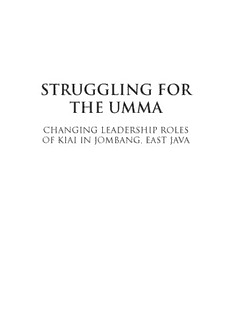Download Struggling for the Umma: Changing Leadership Roles of Kiai in Jombang, East Java PDF Free - Full Version
Download Struggling for the Umma: Changing Leadership Roles of Kiai in Jombang, East Java by Endang Turmudi in PDF format completely FREE. No registration required, no payment needed. Get instant access to this valuable resource on PDFdrive.to!
About Struggling for the Umma: Changing Leadership Roles of Kiai in Jombang, East Java
This thesis focuses on the relationship of Indonesian kiai ('ulama: religious leaders) in Jombang to their wider social and political situation. It argues that the charismatic authority exerted through the leadership of the kiai in Java has limitations in terms of its legitimacy. At the very least it has boundaries that determine areas or circumstances for its legitimate expression. It also argues that the kiai's influence in politics is not as strong as in other domains. Despite being a charismatic figure, only a minority of followers feel compelled to follow the kiai's political example. Differences between the kiai and his followers in relation to political behaviour are common, especially after the transformation of the Islamic political party. Nevertheless, the role of the kiai in general remains important in the eyes of Muslim society.** [C:\Users\Microsoft\Documents\Calibre Library]
Detailed Information
| Author: | Endang Turmudi |
|---|---|
| Publication Year: | 2006 |
| ISBN: | 1920942432 |
| Pages: | 238 |
| Language: | English |
| File Size: | 1.535 |
| Format: | |
| Price: | FREE |
Safe & Secure Download - No registration required
Why Choose PDFdrive for Your Free Struggling for the Umma: Changing Leadership Roles of Kiai in Jombang, East Java Download?
- 100% Free: No hidden fees or subscriptions required for one book every day.
- No Registration: Immediate access is available without creating accounts for one book every day.
- Safe and Secure: Clean downloads without malware or viruses
- Multiple Formats: PDF, MOBI, Mpub,... optimized for all devices
- Educational Resource: Supporting knowledge sharing and learning
Frequently Asked Questions
Is it really free to download Struggling for the Umma: Changing Leadership Roles of Kiai in Jombang, East Java PDF?
Yes, on https://PDFdrive.to you can download Struggling for the Umma: Changing Leadership Roles of Kiai in Jombang, East Java by Endang Turmudi completely free. We don't require any payment, subscription, or registration to access this PDF file. For 3 books every day.
How can I read Struggling for the Umma: Changing Leadership Roles of Kiai in Jombang, East Java on my mobile device?
After downloading Struggling for the Umma: Changing Leadership Roles of Kiai in Jombang, East Java PDF, you can open it with any PDF reader app on your phone or tablet. We recommend using Adobe Acrobat Reader, Apple Books, or Google Play Books for the best reading experience.
Is this the full version of Struggling for the Umma: Changing Leadership Roles of Kiai in Jombang, East Java?
Yes, this is the complete PDF version of Struggling for the Umma: Changing Leadership Roles of Kiai in Jombang, East Java by Endang Turmudi. You will be able to read the entire content as in the printed version without missing any pages.
Is it legal to download Struggling for the Umma: Changing Leadership Roles of Kiai in Jombang, East Java PDF for free?
https://PDFdrive.to provides links to free educational resources available online. We do not store any files on our servers. Please be aware of copyright laws in your country before downloading.
The materials shared are intended for research, educational, and personal use in accordance with fair use principles.

